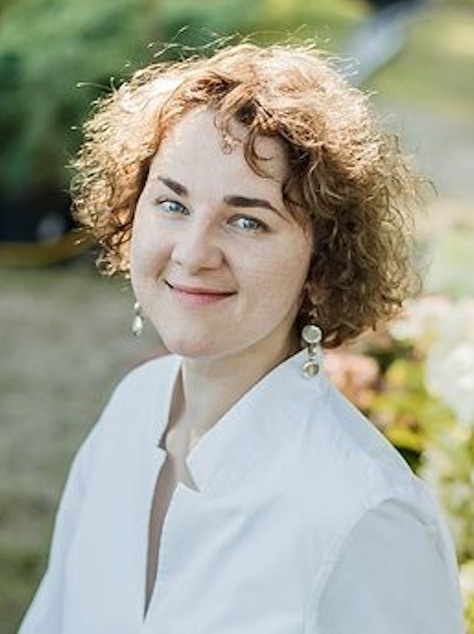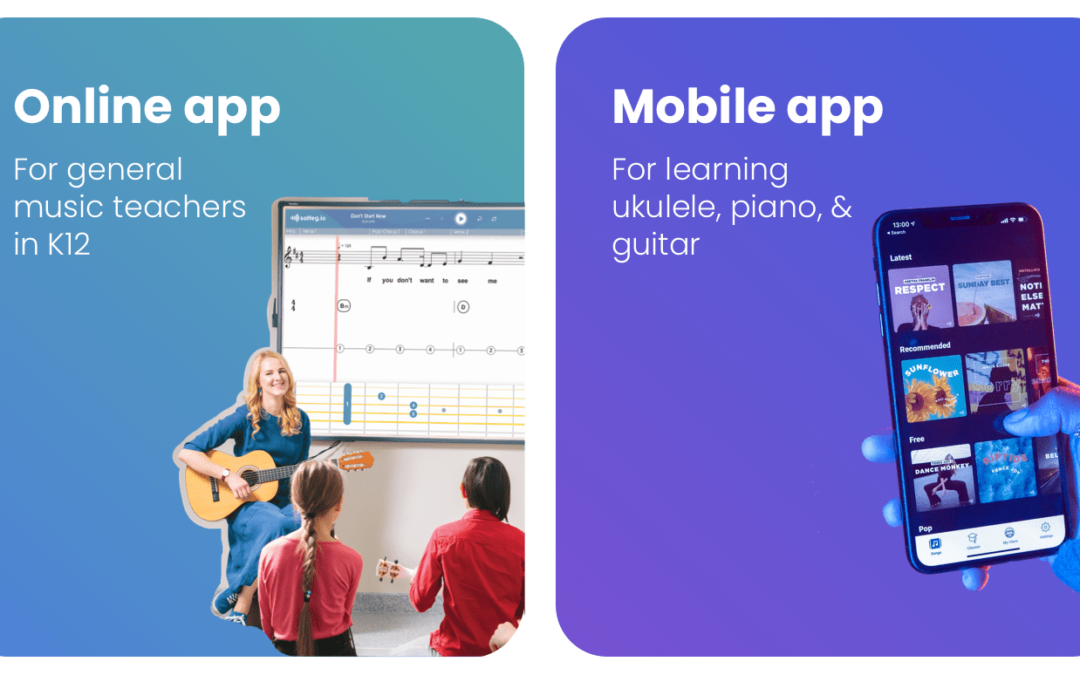Applicability of Digital Learning Strategies (DLS) in Teaching General Music, Guitar, Ukulele, and Piano
By Lauma Kazaka, sponsored by Solfeg.io
Since 2017 the team behind Solfeg.io music education app has been studying student engagement and the advantages of technology we can use to increase their motivation to learn music. In 2020, we carried out an empirical study to explore the effectiveness of digital learning strategies (DLS) for the unique methodology of teaching music instruments we had just developed. We would like to share a summary of the results we achieved by applying Solfeg.io music education app to general music lessons and the science behind the study.
Solfeg.io is used on computers, tablets, and iOS smartphones to learn music individually or in a collective setting as a classroom. It’s used by more than 7,000 music teachers in the USA schools and more than 30,000 individuals. The app includes a library of well-known songs by popular artists that engage students to practice musical instruments and understand how music works. The purpose of the app is to provide support for the implementation of music education curricula and the acquisition of educational content.
According to the principles of SMART Pedagogy, it is important to educate students on meaningful use of technology, providing specific tasks to activate students’ cognitive interest in learning music, as well as promote socioemotional development. Solfeg.io music education app is designed according to SMART Pedagogy criteria for meaningful use of technology in the study process. The app has been developed to meet didactic, cognitive, socio-emotional, and technical requirements for learning music to create a customizable, user-oriented experience in a pedagogically justified study environment.
In developing digital education tools, it is necessary to execute the following didactic principles: sequence, comprehensibility, correspondence to age, individualization, differentiation, self-growth, and persistence of knowledge to be able to set and achieve purposeful learning goals.
Solfeg.io music education app follows the principle of sequence by offering song learning strategies for beginners and students with prior knowledge. The song library includes song descriptions and filters for song selection (by music genre, key, chords in the song, etc.). Each song can be adapted for learning needs, depending on the content and guidelines of the music subject.
Each student’s musical development takes place at its own pace and level, but progress towards a certain goal should occur in each lesson. With Solfeg.io app, it is possible to adapt the educational content to the level of knowledge and individual needs of each student and to provide feedback to find out how the student is learning and moving towards the goal. The learning goal in the digital environment should be pedagogically justified to arouse students’ cognitive interest and promote cognitive development, but at the same time—be achievable, so that the motivation to learn develops further.
The use of technology in the music teaching process will only increase, as the interactive and creative opportunities it offers involve even those young people who have not previously shown interest in the subject of music. Solfeg.io app has been designed to stimulate students’ interest to learn music, using the technological possibilities to create suitable conditions for both individual and collective music-making.
The digital generation often learns, explores, and acquires knowledge and skills on an individual basis; therefore, the model of self-directed learning becomes relevant. The innovation of Solfeg.io app lies in digital learning strategies—learning to play music with the help of self-directed classes. Strategies consist of chat messages with text or audiovisual materials (images, videos). The student is guided through chat messages to reach a learning goal, e.g., to play a song. The classes include principles of self-directed learning, letting the student customize the learning process. The classes are designed to engage the digital generation and support their information perception and processing needs.
In developing DLS, it is important to gradually lead the student to the learning goal and help develop skills like planning, analyzing, and adapting the learning process. According to principles of development of digital education tools, DLS includes functionality to support self-directed learning that creates the sense of the presence of a teacher and divides the tasks into successive steps, based on a pre-programmed sequence that is influenced by the user’s feedback. The educational content is communicated through text, images, and videos that are pre-designed components of the sequence.
Compared to other digital music education tools, Solfeg.io is the only app that offers self-directed classes. Therefore, it is important to study how to develop an effective digital tool for learning the basics of playing musical instruments, including piano, ukulele, and guitar. Recognizing the topicality, the DLS was developed to carry out an empirical study to determine its applicability and effectiveness in reaching the set learning goal. The empirical study included pedagogical observation, respondent surveys, and analysis and interpretation of the obtained qualitative data.
The results of the empirical study suggest that DLS has been developed following the information perception habits of the digital generation. Respondents performed the tasks independently, and the learning process was facilitated by: a form of chat communication, design of the app, use of audiovisual means of communication, message structure, and tone of voice, suggesting that DLS is an appropriate form of learning for the digital generation—by performing the tasks included in the strategy, respondents have acquired basic guitar playing skills and are engaged to continue learning to play the guitar.
Respondents’ engagement in the learning process encourages the development of DLS for other musical instruments and theoretical topics of the music curriculum. The results of the empirical study suggest that students can use DLS to learn musical instruments and songs available in the app in class or individually, as well as play together with others, providing meaningful activity for personal development in their free time.
The full article “Applicability of the digital learning strategy ‘Start playing the guitar!’ in Solfeg.io music education app” can be found on the website of the International Journal of Smart Education and Urban Society (Volume 12, 2021).
References:
Bahr, N., Carroll, A., Effeney, G. (2013). Self-Regulated Learning: Key Strategies and Their Sources in a Sample of Adolescent Males. Australian Journal of Educational & Developmental Psychology, Vol. 13, pp. 58-74
Daniela, L. (2018). Smart Pedagogy for Technology-Enhanced Learning. In: Daniela L. (Ed.) Didactics of Smart Pedagogy. Cham: Springer
Donnison, S. (2004). The ‘Digital Generation’, Technology and Educational Change: an Uncommon Vision. Australia: Griffith University
Greher, G. R. (2006). Transforming Music Teacher Preparation through the Lens of Video Technology. Journal of Music Teacher Education, 15 (2), pp. 49-60
Hallam, S. (2002). Musical motivation: Toward a model synthesizing the research. Music Education Research, 4 (2), 225-244.
Mills, K.L. (2016). Possible Effects of Internet Use on Cognitive Development in Adolescence. Media and Communication, 4 (3), 4-12.
Vilde, I., Medne, D. (2014). Facilitating the development of musical memory in primary school music teaching. International Scientific Conference “Problems in Music Pedagogy”, Volume 13 (1), 2014. Daugavpils University, p. 73-82.
About the author:
 Lauma Kazaka is a composer, music educator, and co-founder of Solfeg.io music education app (www.solfeg.io), currently pursuing a Ph.D. in systematic musicology.
Lauma Kazaka is a composer, music educator, and co-founder of Solfeg.io music education app (www.solfeg.io), currently pursuing a Ph.D. in systematic musicology.
Did this blog spur new ideas for your music program? Share them on Amplify! Interested in reprinting this article? Please review the reprint guidelines.
The National Association for Music Education (NAfME) provides a number of forums for the sharing of information and opinion, including blogs and postings on our website, articles and columns in our magazines and journals, and postings to our Amplify member portal. Unless specifically noted, the views expressed in these media do not necessarily represent the policy or views of the Association, its officers, or its employees.
June 30, 2021. © National Association for Music Education (NAfME.org)
The post Applicability of Digital Learning Strategies (DLS) in Teaching General Music, Guitar, Ukulele, and Piano appeared first on NAfME.


